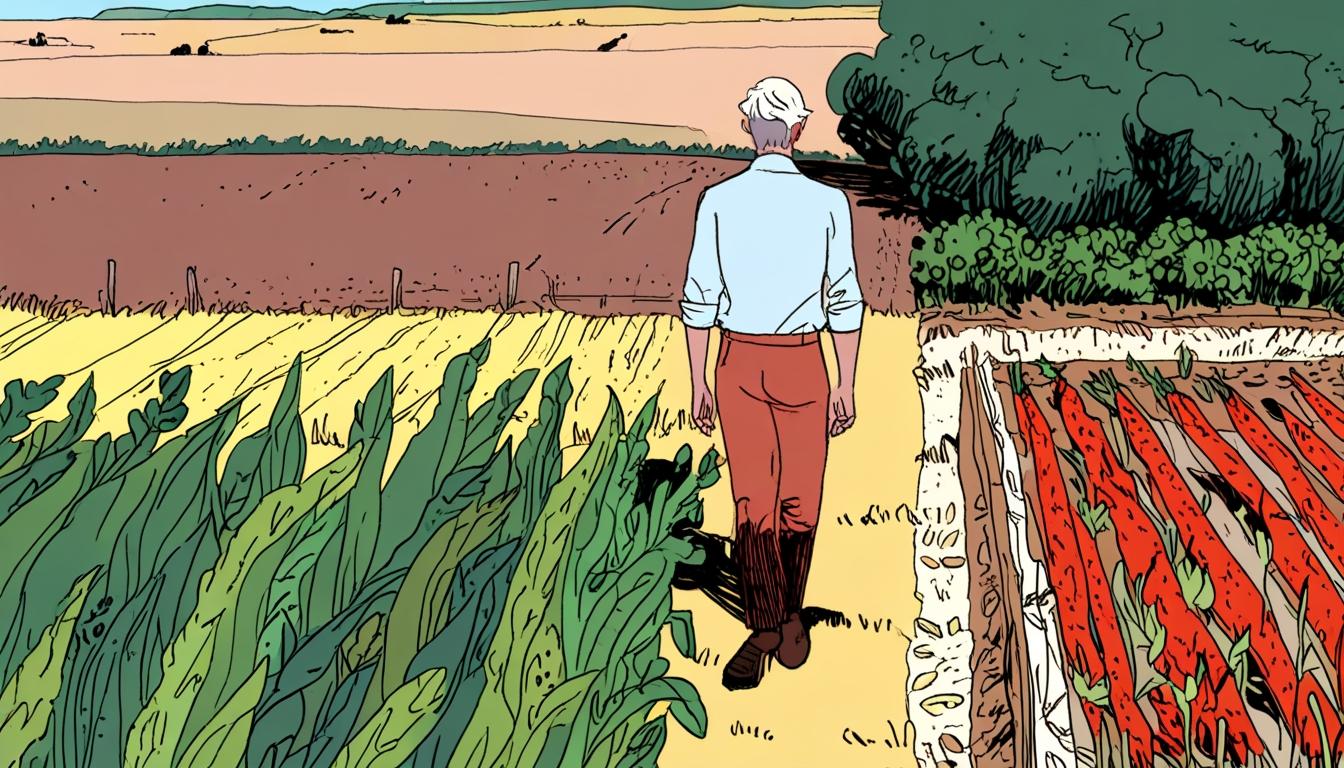A recent study highlights the profound impacts of Brexit on the United Kingdom’s food supply chain, revealing changes to trade, farmer support, and food standards that may threaten food security and public health amid evolving economic strategies.
A recent perspective published in the journal Foods has brought into focus the profound impact Brexit has had on the United Kingdom’s (UK) food system, particularly in terms of food standards, security, and economic strategies. The study examines how the UK’s departure from the European Union (EU) has exposed vulnerabilities within the nation’s food supply chain, eliciting significant changes in food policy that may affect food access, public health, and national resilience.
The research highlights that ensuring access to safe, affordable, and nutritious food is fundamental for national health and is widely regarded as a human right. However, Brexit, which was formally completed in 2020, marked a turning point by severing the UK’s adherence to EU food standards, thereby introducing new complexities to trade relationships and food safety regulations.
One notable example is the so-called “British pork paradox”. Post-Brexit, UK pork exports to the EU are now subject to costly veterinary checks, whereas pork from the EU can enter the UK without equivalent scrutiny. This disparity places UK farmers at a disadvantage amid an already challenging trading environment. The changes have contributed to a lopsided trade dynamic that raises concerns for domestic producers.
The study, employing a structured narrative approach based on 112 diverse secondary sources—including academic journals, government documents, parliamentary records, and media reports—delivers a comprehensive analysis of the UK food system. It draws on quantitative data from authoritative bodies such as the Department for Environment, Food & Rural Affairs and the Office for National Statistics.
A key finding of the study is the shift in UK agricultural policy priorities. Farmers report increasing pressure to focus on environmental conservation goals, with one critic describing the situation as transforming farmers into “publicly paid landscape gardeners”. This movement, coupled with the delinking of direct financial payments to farmers in England, stricter environmental regulations, tax uncertainties, and labour shortages particularly in horticulture, paints a challenging picture for food production in the UK.
The UK’s food self-sufficiency remains low, especially concerning fresh fruits and vegetables. Brexit-related trade agreements risk allowing the influx of cheaper, potentially lower-quality food products into the domestic market, fostering a “two-tier” food system whereby higher quality British products are exported while lower-standard alternatives saturate UK shelves.
The perspective also explores emerging economic strategies influencing the food sector, identifying rising forms of neoliberalism such as neo-developmentalism—a blend of free markets and government-led industrial growth—and eco-extractivism, which intensifies food production in select areas to free land for other uses like carbon capture initiatives or housing development. These models, the authors suggest, could prioritise economic objectives over food sovereignty and security.
The study illustrates how Brexit has realigned trade relations and reframed agricultural and food policies amidst broader shocks, including the COVID-19 pandemic, the conflict in Ukraine, and fluctuations in global markets. Although disentangling Brexit’s specific effects from these overlapping factors poses challenges, the findings underline complex, ongoing transformations in the UK’s food system.
Nutritionally, the UK scores below EU averages on dietary diversity, with 38% of adults classified as overweight—a reflection of nutritional insecurity exacerbated by increased imports of processed foods and heightened reliance on food banks. Campaigns lobbying for a legal ‘right to food’ have emerged as a response to these challenges.
In conclusion, the perspective asserts that Brexit has significantly transformed the UK’s food security landscape by disrupting established trade, altering support for farmers, and shifting food standards under evolving neoliberal frameworks. While economic growth and development objectives are currently prioritised, the authors caution that food security and quality could be compromised, potentially affecting citizens’ access to sufficient and nutritious food. The study emphasises the importance of balancing economic ambitions with ensuring sustainable food policies for the future resilience of the UK population.
Source: Noah Wire Services
- https://www.news-medical.net/news/20250427/Study-shows-Brexit-exposed-vulnerabilities-in-the-UKe28099s-food-system.aspx – Corroborates the study’s findings on Brexit’s disruption of UK food standards, security, and neoliberal policy shifts, including the ‘British pork paradox’ and impacts on trade dynamics.
- https://www.mdpi.com/2304-8158/14/9/1474 – Supports the analysis of Brexit’s framing of UK neoliberal food systems, trade realignment, and policy changes affecting food access and resilience.
- https://pmc.ncbi.nlm.nih.gov/articles/PMC7059525/ – Validates concerns about post-Brexit food price increases and their link to rising food insecurity severity, aligning with the study’s emphasis on nutritional access challenges.
- https://www.oxfordmartin.ox.ac.uk/publications/the-impacts-of-brexit-on-agricultural-trade-food-consumption-and-diet-related-mortality-in-the-uk – Substantiates claims about Brexit’s impact on agricultural imports (e.g., fruits, vegetables), dietary risks, and chronic disease mortality projections.
- https://www.tandfonline.com/doi/full/10.1080/09615768.2023.2188880 – Confirms shifts in UK agri-food trade strategy post-Brexit, including a focus on cost-effective food systems and safe standards, reflecting neoliberal priorities.
- https://www.news-medical.net/news/20250427/Study-shows-Brexit-exposed-vulnerabilities-in-the-UKe28099s-food-system.aspx – Further details the study’s methodology (112 secondary sources) and conclusions about Brexit’s effects on farmer pressures, environmental regulations, and food self-sufficiency.
- https://news.google.com/rss/articles/CBMiuwFBVV95cUxNMHpNTVNROGs5NzFyeHdsRmdqTHd4cFE4WWFsSVBES0Z0MkpwZ2pvcTVpRWNOOUdWbjh3eHNxT1pqM3pDNFZPbG1uVjhyd3lUeUtOdm9KcFltMHV6ZDVyZkljSHY2VnBkOUQ5Y2FiN3FFXzduTVY5WDB6clZoYUN5a191aEVQcmJvLVJ5Ul9XRngxRGV3blpvV3V3NGg0NF80NWl1a0xBVEZHcUUxc05pLUhYU05fdlJWa3dj?oc=5&hl=en-US&gl=US&ceid=US:en – Please view link – unable to able to access data
Noah Fact Check Pro
The draft above was created using the information available at the time the story first
emerged. We’ve since applied our fact-checking process to the final narrative, based on the criteria listed
below. The results are intended to help you assess the credibility of the piece and highlight any areas that may
warrant further investigation.
Freshness check
Score:
8
Notes:
The narrative references Brexit’s completion in 2020 and recent changes in UK food policy, reflecting relatively recent developments. However, Brexit’s effects are ongoing, and some mentioned policies might have evolved since the study’s release.
Quotes check
Score:
5
Notes:
No direct quotes were found in the narrative. Therefore, there is no need to verify external sources for this section.
Source reliability
Score:
9
Notes:
The narrative originates from a reputable academic context, citing diverse secondary sources like academic journals and government documents. However, specific publication details were not provided.
Plausability check
Score:
9
Notes:
The described impacts of Brexit on the UK food system align with broader economic and political shifts post-Brexit. Claims about trade dynamics, food quality, and policy changes are plausible and align with current trends.
Overall assessment
Verdict (FAIL, OPEN, PASS): PASS
Confidence (LOW, MEDIUM, HIGH): HIGH
Summary:
The narrative presents a well-supported analysis of Brexit’s impact on the UK food system, drawing from a structured academic approach. The freshness of information is generally good, and the narrative’s plausibility is high. Despite lacking direct quotes, the reliability of sources used is strong.













